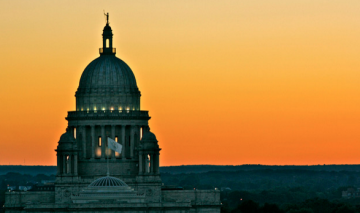Robert Whitcomb: Korean Quandary; Politicians Trying to Do the Right Thing; ‘Passive Housing’
Monday, August 14, 2017

Robert Whitcomb
What I find so interesting is, Herbert Hoover in August 1928 said no country in the world was closer to abolishing poverty than the United States. And then, of course, we had the Great Depression.
-- Presidential historian Robert Dallek
President Trump does not have a steady voice but, assuming that he means it, his appropriately fierce threats to the murderous North Korean regime may be useful. The only thing that Kim Jong-un and other dictators respect is force. To “negotiate” with gangsters like Kim only gives them more time to strengthen their capacity for aggression. That’s what the Kim dynasty has done for years as they have entered “negotiations’’ from time to time and then broken every agreement they signed. When it comes to dealing with North Korea, much ballyhooed “diplomacy’’ is simply dithering.
But bluster by the U.S. without utterly convincing proof that we’re willing to use lethal force will be seen as a sign of weakness, as was President Obama’s catastrophic failure to attack another mass murderer, Syrian dictator Bashar Assad, after Obama had warned him that using chemical weapons would be a “red line’’.
We also ought to bear in mind that Kim wants more than just to preserve his hideous regime; he wants to get American troops out of South Korea and then to subjugate it. And China wants its lackey North Korea to be bellicose: It forces America to divert military and other resources away from challenging Chinese efforts to take over the South China Sea.
The wishful thinking about North Korea is getting very tedious.
xxx
Now that the Rhode Island General Assembly has finally agreed on a state budget, you hear the usual complaints about politicians and their deal-making. But everyone has to make deals, be it in government, business or private life, to get important things done. The challenge is far tougher in politics/government than in other sectors because there are so many constituencies and because things are much more public than in, say, private business, which can be far more corrupt than government, at least government in the West.
Indeed, given the relentless invasions of privacy and constant complaints/threats (usually unaccompanied by thoughtful suggestions) that politicians must live with, it’s astonishing that as many (but not enough) good people enter the fray of elective politics as do these days.

RI State House
Meanwhile, the new Rhode Island budget looks like a reasonable document put together by generally practical people, as does much of the other legislation enacted this year.
Of course, as always, given the power of certain constituencies, there will always be bad laws, such the one just enacted that will let public-safety people go out on disability pensions for illnesses developed in the course of their careers but not necessarily as a result of their work – e.g., very common ailments such as heart disease. Disability-pensions are already widely and grotesquely abused in Rhode Island – at great cost to the taxpayers; this will make the problem considerably worse. The legislature, in passing this lousy law, was trying to please the public-employee unions, whose members vote at a very high rate and who provide powerful financial and logistical support to candidates they support.
xxx
In the fall, the General Assembly will have a difficult decision to face on whether to put millions of dollars in public money into a proposed new stadium for the Pawtucket Red Sox. It will be difficult because there’s little evidence from around America that professional sports stadiums help economic development, except, in some places, in the immediate neighborhood of a stadium. And, of course, public money that is given to such projects is money that isn’t going to another public project (such as fixing the roads and schools) or into tax cuts. There’s a big opportunity cost involved.
The strongest pitch for publicly assisted stadiums to be used by for-profit teams is emotional: Having a local pro team can make a lot of fans happy – not richer, but happier. There’s value in that but it can't be measured.
xxx
What should be on the agenda for the General Assembly’s next regular session, to open next winter? Legislation to further ease the streamlining/simplification of the state’s regulations and new moves to make Rhode Island’s tax structure as similar as possible to Massachusetts’s would be good. The Ocean State must accept that a lot of its policies will be made on Beacon Hill, not Smith Hill. The very rich and powerful Bay State dominates New England, and forces the Ocean State to try to have competitive policies.
Oh yeah, the legislators should make graffiti and other vandalism on public property a felony. This vandalism has reached epidemic proportions.
xxx
If you’re a Rhode Islander unhappy with the prospect of paying National Grid a big electricity-rate increase, then go http://www.ri.gov/empowerri and find a cheaper supplier to buy from; they’re there.
xxx
Tom Price, M.D., the U.S. secretary of health and human services, has already made it clear that two of his major goals will be to get physicians paid more and to benefit for-profit health-related companies in which he has invested.
Consider that Dr. Price, an orthopedic surgeon, is giving the union known as the American Medical Association even more power than it has long had over the compensation of U.S. physicians, who are already by far the highest-paid in the world. HHS will henceforth let an AMA panel set the prices that Medicare (the biggest health payer) will pay the doctors for individual services. What a delightful conflict of interest. Don’t we all wish we could set our own pay!
Yet more reasons to think that healthcare costs will continue to climb at a pace way over general inflation. Eventually, the cost to the public of extreme profiteering will climb so high that a single-payer system will be created to bring it under some modest control.
xxx
We in New England don’t pay enough attention to the potential of “passive housing,’’ in which new insulation techniques, triple-glazed windows, advanced ventilation systems and other features can slash heating and air-conditioning bills. The New England News Collaborative ran a good story on this the other week. READ HERE
“Passive housing’’ can be so efficient that some folks can eliminate their need for central heating systems. But many property owners can make major cuts in their heating bills simply by, for example, replacing the screens on back porches with double-glazed windows. Even on cold days, you can often get enough solar heating in such spaces to avoid heating them. Indeed, if your sun exposure is good enough (especially after nearby deciduous trees have lost their leaves in fall) you can put up a fan and blow the sun-heated air into your house to cut down on your heating bills –only during the day, of course!
Big passive housing projects have been underway for some time in Western Europe. New England, with its cold winters, high energy bills, and environmentalism, seems the friendliest place in the U.S. for this new kind of building.
xxx
Congratulations to RI Mushroom Co., featured in an Aug. 6 Providence Journal story headlined “They’ve spawned success with rooms of ‘shrooms.’’ It’s a lovely entrepreneurial tale, in which partners Michael Hallock and Robert DiPietro have expanded their mushroom-growing, packaging and sales operation from a “1,500-square-foot facility with one 16-by-50-foot grow room to a 10,000-square-foot facility with three grow rooms, a large packaging room and 1,000 square feet of office space.’’ They told The Journal that they eventually want to grow $100 million a year of mushrooms.
Mushrooms are increasingly popular and it’s unlikely that Amazon will take away the duo’s business. The article reminded me of the broader potential of such indoor agriculture in southern New England. Well-insulated greenhouses could be used to grow a lot of the fresh vegetables that New Englanders now must get from far away (at considerable environmental cost) outside the region’s main vegetable-growing season of May to October. Iceland, of all places, grows a lot of its own vegetables in greenhouses, albeit with the help of that nation’s geo-thermal riches.
Put up greenhouses on the vacant parking lots around the proliferating number of closed suburban malls and big-box stores, where they could share space with wind turbines and solar-panel arrays.
xxx
With GPS and Internet communication so obviously vulnerable to hackers, including those working for unfriendly foreign powers and terrorists, some nations are seeking to develop back-up systems based on old-fashioned radio technology for communication by ocean shippers. See this Reuters story:
Increasingly, some of the pre-Internet ways of doing business seem attractive. For instance, online banking can be perilous. Maybe stick with PAPER checks. Drop by your bank and make your deposits with a human teller, who could become very helpful in resolving future banking snafus if he/she gets to know you. A computer will be less interested in your problems. Anything to reduce the number of electronic layers in which bad guys can steal from you.
For anything really important write a real, physical letter. Do not send condolence notes, or end a relationship, or fire anyone by email.
xxx
Political cults of personality promoted by demagogues end badly. Look at Venezuela, where socialist President Nicolas Maduro has turned himself into a dictator as his brutal but incompetent regime has destroyed much of the economy and human rights. Maduro set himself as the heir to the charismatic populist demagogue Hugo Chavez, who as president presented himself up as savior to his mostly poor and deluded followers. Political leaders who promote themselves as irreplaceable leaders are intrinsically corrupt and dangerous, and that extends to their handpicked successors, such as Maduro.
Given that Maduro (who even looks like a thug) obviously seeks to be president for life, whatever it takes, the only solution for once prosperous Venezuela is for the army to overthrow him. He has a highly effective secret police and he’s paid off some key elements of the armed forces, but even so, so awful is his regime that he can’t count on his current powerful allies to remain so indefinitely.
Much of Venezuela, which I have visited, is gorgeous, and it has very rich natural agricultural and mineral resources, most famously oil. But there are now shortages of gasoline and other oil derivatives, leading me to repeat the old joke that if Communists were in charge of the Sahara Desert, there would soon be a sand shortage there. Venezuela also has had a large and educated middle class, but many of its members have fled the country, taking their skills, and some of their capital with them. That’s especially good news for the Florida economy!
xxx

President Ronald Reagan
Rather, Mr. Shiller reports, the term more traditionally referred to “freedom, mutual respect and equality of opportunity. It had more to do with morality than material success.’’
The phrase “The American Dream" was coined by popular historian (and prosperous former Wall Streeter) James Truslow Adams in his 1931 book The Epic of America. He described the American Dream as "that dream of a land in which life should be better and richer and fuller for everyone, with opportunity for each according to ability or achievement. It is a difficult dream for the European upper classes to interpret adequately, and too many of us ourselves have grown weary and mistrustful of it. It is not a dream of motor cars and high wages merely, but a dream of social order in which each man and each woman shall be able to attain to the fullest stature of which they are innately capable, and be recognized by others for what they are, regardless of the fortuitous circumstances of birth or position."
A tad different than Trump’s “The American Dream is back’’ remarks in January, which included “We are going to create an environment for small business like we haven't seen in many decades. So essentially, we are getting rid of regulations to a massive extent, could be as much as 75 percent.’’ Well, there may well be far too many regulations, but getting rid of 75 percent of them is unlikely to put us on the broad sunlit uplands of the American Dream, especially ones aimed at protecting public health and safety.
xxx
We went down to the Cape the other day to stay with a cousin in a house on a harbor on Buzzards Bay. I thought of how much the Cape had changed since my boyhood, in the ‘50s. Then, much of it was truly rural, with small farms and many cranberry bogs. There were no superhighways. Approaching from Boston’s southeastern suburbs, you’d go down Route 3A, which would become increasingly rustic as you headed south, with farm stands and general stores. The closer we got to the Cape Cod Canal, the more the air smelled like pine, as we entered a state forest.
Then the excitement of crossing the Sagamore Bridge onto an island/peninsula then devoid of big box stores, malls and gated retirement communities and on to my paternal grandparents’ gray-shingled house in the village of West Falmouth, the land of which some of my Quaker ancestors had bought from the Indians in the 1600’s. Then, if there were still time, to the beach, where the water was much cleaner and warmer than in Massachusetts Bay, and where the private bathhouse would get destroyed from time to time in hurricanes, to which Buzzards Bay is particularly vulnerable.
After that, getting some ice cream from the village’s one and only general store. Then maybe a trip to Woods Hole the next day to see the aquarium of the world-famous Oceanographic Institution there. Woods Hole was where some of my ancestors built boats and partnered in the Pacific Guano Co., where bird excrement from Pacific Islands was processed with fish meal to make what was considered in the 19th Century the best fertilizer. Nowadays, it’s hard to think of Woods Hole as a factory town. Rather, it’s now in effect a college town.
As for West Falmouth, while it’s still almost as pretty as it was 60 years, it’s a ghost town to me since virtually everyone I knew there has died or otherwise gone elsewhere.
Or we occasionally approached the Cape from the west, on Route 6, with its strips of clam shacks, cheap motels and kitschy tourist-oriented gift stores. Ugly, but delightful to young children. Now, of course, you miss the local and often tacky texture on the boring big divided highways. And these highways draw in so much out-of-region traffic that the traffic jams on the two road bridges (there’s also the beautiful railroad bridge) mean driving to the Cape can take considerably longer now than in the ‘50s.
Because of that and because too much of this glacial moraine now looks like exurbia or suburbia, we don’t make many visits anymore to Olde Cape Cod. Still, the air down there still has a certain luminosity.
Related Articles
- Bob Whitcomb’s Digital Diary: Donald Trump’s Emails and Pearl Harbor
- Bob Whitcomb’s Digital Diary: Making Voting Dangerously Easy; RI Corruption; & Con-Men Clerics
- Bob Whitcomb’s Digital Diary: RR and PC’s Diversity Issues
- Bob Whitcomb’s Digital Diary: Animal Rights, Electoral College, and RI’s Jobless Rate
- Bob Whitcomb’s Digital Diary: “Maybe Beggars, Such as Providence, Can’t be Choosers”
- Bob Whitcomb’s Digital Diary: Bikes, Bush, and Merger Mega-Healthcare Collapse
- Bob Whitcomb’s Digital Diary: Trump and Clinton, Raimondo’s CA Developer, and Warren’s Greatness
- Bob Whitcomb’s Digital Diary: EU, Newport NIMBYs, and Obamacare
- Bob Whitcomb’s Digital Diary: Superman Building, Mike Pence and Hillary
- Bob Whitcomb’s Digital Diary: Legalizing Marijuana, Green Power, and Howard Johnson
- Bob Whitcomb’s Digital Diary: Catholic Church, Wells Fargo, and Rabbi Gutterman
- Robert Whitcomb’s Digital Diary: Clinton, Russian Hackers, and CVS Pressure
- Robert Whitcomb’s Digital Diary: Providence Bankruptcy and Worcester’s Resurgence
- Robert Whitcomb: Opportunity Cost, Continued; Vague Stadium ‘Animal Spirits’; Don’t Let Them Vote
- Robert Whitcomb: PawSox Play, Watergate Summer De Luxe
- Robert Whitcomb: Christmas for RI’s Public Unions; Worcester Pitching the PawSox; Thayer St. Churn
- Whitcomb Says Chances of PawSox Going to Worcester are Slim
- Robert Whitcomb: Trump’s Transgender, NFL’s CTE Problem, Stone House and Little Compton
- Robert Whitcomb: New Main Streets; Lifespan’s Threat; & University Bloat
- Robert Whitcomb: Robots Consuming Wall St. Jobs; New Stadium Redux? Temples to the Kennedys
- Robert Whitcomb’s Digital Diary: Shrinking New England & Banking with Trump
- Robert Whitcomb’s Digital Diary: Worcester Growth and Mafia Boredom
- Robert Whitcomb: Raimondo’s No-Bid Contract, Gov. Baker’s MBTA, and Spring
- Robert Whitcomb: Throw the Book at Taggers: Put Transit Center Below Ground? Storing Windpower




Follow us on Pinterest Google + Facebook Twitter See It Read It